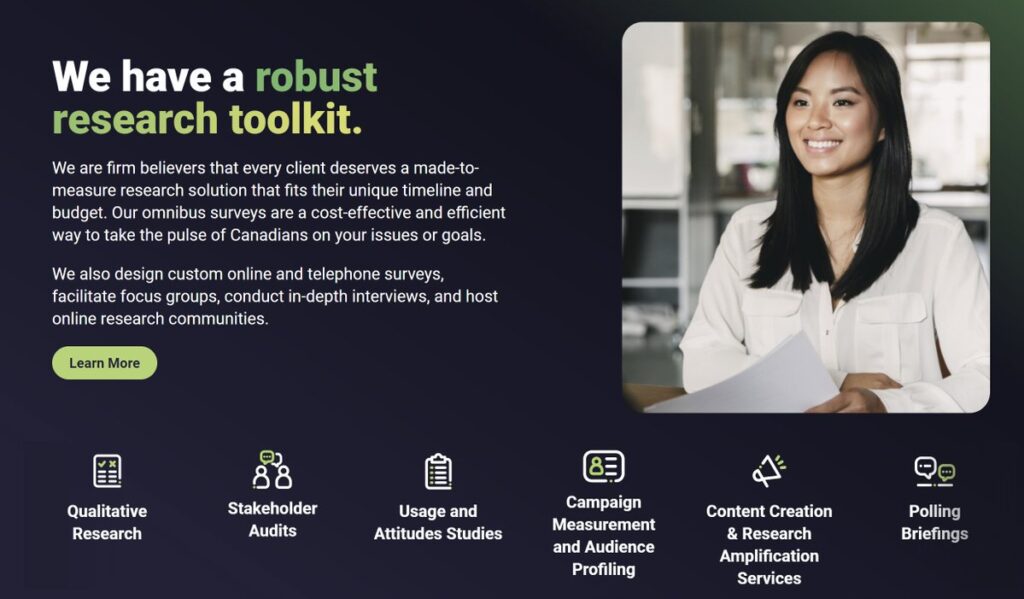Optimism Meets Uncertainty and even Fear in Canada’s AI Landscape
July 25, 2025
Between July 10 and 15, 2025, Abacus Data conducted a national survey of 1,915 Canadian adults to examine their perceptions and opinions about artificial intelligence (AI). As AI rapidly becomes a fixture of our daily lives, Canadians are grappling with a complex mix of curiosity, skepticism, fear, and optimism. From virtual assistants, fast diagnostics, rapid customer service, and smart devices to recommendation systems, AI is becoming increasingly embedded in the fabric of our daily routines. Governments, corporations, and influencers are touting the benefits. But the big question remains: Are we truly ready to embrace its opportunities, or are we cautious or even scared about the risks it brings? The truth lies somewhere in between.
The Growing Presence of AI in Everyday Life
AI is here, and it is becoming a part of many Canadians’ daily lives, even if they don’t always realize it. 45% of Canadians use AI tools on a regular basis, while 55% note that they rarely or never engage with AI. When considering usage, there is a clear generational divide: Younger Canadians are far more likely to use AI, with 72% of those aged 18-29 and 62% of those aged 30-44 regularly incorporating it into their lives. In contrast, just 20% of Canadians aged 60+ use AI on a regular basis. This growing reliance on AI among younger generations signals a significant shift, one that has the potential to expand as technology becomes even more integrated into everyday life.


Trust and Distrust in AI
When it comes to trust in AI, Canadians are split: 37% trust in AI, but a significant 50% remain skeptical about its role in society. Young people tend to be more trusting: 57% of 18-29-year-olds express confidence in AI, while only 20% of Canadians 60+ share that sentiment. Men also tend to trust AI more than women, with 42% of men confident in its capabilities compared to just 32% of women.


What accounts for this gap? Familiarity plays a significant role. While 53% of Canadians say they are familiar with AI tools, this figure is notably higher among younger, more tech-savvy groups. Specifically, 74% of those aged 18-29 and 67% of those aged 30-44 are comfortable navigating the AI landscape. In contrast, 69% of Canadians aged 60+ report being unfamiliar with AI.


Moreover, familiarity with AI is closely linked to trust. Among those who are familiar with AI, 56% express trust in it, compared to just 16% of those who are not familiar. Additionally, frequent users of AI report higher levels of trust—69% of regular AI users trust it, while only 17% of occasional users and just 5% of non-users share that sentiment. This highlights the need for improved AI literacy across all generations to foster greater trust and understanding.

The Benefits of AI: Optimism for the Future
Despite the skepticism that comes with technological advancements, there is unmistakable evidence of AI’s ability to revolutionize and improve various aspects of life. Many Canadians see AI as a tool for increased efficiency and productivity, with 33% believing it can reduce human error and 30% feeling it will improve access to information and education. Others are excited about the promise of convenience in daily life, enhanced healthcare, and new opportunities for creativity and innovation.
However, not everyone is convinced. Only 13% believe AI will significantly drive economic growth or create new jobs, and 24% feel it will have no positive impact on society. Despite these concerns, many Canadians see AI’s value in improving everyday experiences – whether through faster decision-making, personalized recommendations, or even advancements in healthcare and other industries.

The Dark Side of AI: Concerns and Risks
While AI offers many benefits, it also raises significant concerns with the public. Many Canadians fear AI could be used for malicious purposes, with 43% worried about its potential to manipulate or harm. The spread of misinformation is another major issue, cited by 42%, as AI-generated content becomes increasingly difficult to differentiate from truth. Privacy is also a key concern for 38%, who worry about personal data being exploited.
Economic and social fears are prevalent as well. 34% of Canadians are concerned about job losses due to automation, and another 34% fear losing human control over AI systems, with machines making decisions without oversight. Social isolation is another worry for 30%, who fear that increased AI interactions could reduce meaningful human connection. Additionally, 25% are anxious about unintended consequences beyond human control, highlighting the need for careful management and regulation as AI becomes more integrated into society.

Unprepared for Change: How AI Is Changing Our Lives
Most Canadians do not feel prepared for the change that AI will mean for them and society. A little over half (54%) of Canadians feel unprepared to keep up with the rapid pace of change that AI is bringing, with older Canadians (73% of those 60+) feeling the most unready. In contrast, younger Canadians, particularly those aged 18-44, are much more confident in their ability to adapt to AI’s growing role. This divide highlights the need for greater education, engagement, and support to help all Canadians, especially older generations, navigate the challenges and opportunities that AI will bring to our lives.


The Upshot
Governments, including the Mark Carney-led federal government, are charging ahead with AI strategies, investment plans, and regulatory frameworks, aiming to harness AI’s potential to drive innovation, productivity, efficiency, and global competitiveness. However, outside of official Ottawa and in the boardrooms of tech firms, public sentiment remains far more cautious, if not outright skeptical.
As AI continues to evolve, Canadians are presented with both exciting opportunities and significant concerns. While AI holds the potential to transform industries, improve daily life, and spark innovation, its rapid development, combined with limited understanding, has fuelled skepticism and fear. This is particularly true among older generations, who feel disconnected from the technology and its broader implications. And we believe understanding of AI’s impact is underappreciated suggesting public opinion could change rapidly as stories about job losses, disruption, and change continue to spread. The speed of AI’s advancement, coupled with uncertainties about privacy, misinformation, and job displacement, has made many wary of its potential risks.
The gap between elite enthusiasm and public anxiety is dangerous. As David argued in the Toronto Star op-ed recently, it risks creating a political backlash that could rival past populist uprisings, especially if the human costs of AI are downplayed or ignored. To bridge this divide, the government must lead with transparency, addressing concerns head-on while emphasizing AI’s economic and social benefits. Only then can we ensure AI is embraced as a transformative force, rather than a source of fear and division.
Methodology
The survey was conducted with 1,915 Canadian adults from July 10 to 15, 2025. A random sample of panelists were invited to complete the survey from a set of partner panels based on the Lucid exchange platform. These partners are typically double opt-in survey panels, blended to manage out potential skews in the data from a single source.
The margin of error for a comparable probability-based random sample of the same size is +/- 2.24%, 19 times out of 20.
The data were weighted according to census data to ensure that the sample matched Canada’s population according to age, gender, educational attainment, and region.
This survey was paid for by Abacus Data.
Abacus Data follows the CRIC Public Opinion Research Standards and Disclosure Requirements that can be found here: https://canadianresearchinsightscouncil.ca/standards/

ABOUT ABACUS DATA
We are Canada’s most sought-after, influential, and impactful polling and market research firm. We are hired by many of North America’s most respected and influential brands and organizations.
We use the latest technology, sound science, and deep experience to generate top-flight research-based advice to our clients. We offer global research capacity with a strong focus on customer service, attention to detail, and exceptional value.
And we are growing throughout all parts of Canada and the United States and have capacity for new clients who want high quality research insights with enlightened hospitality.
Our record speaks for itself: we were one of the most accurate pollsters conducting research during the 2025 Canadian election following up on our outstanding record in the 2021, 2019, 2015, and 2011 federal elections.
Contact us with any questions.
Find out more about how we can help your organization by downloading our corporate profile and service offering.




